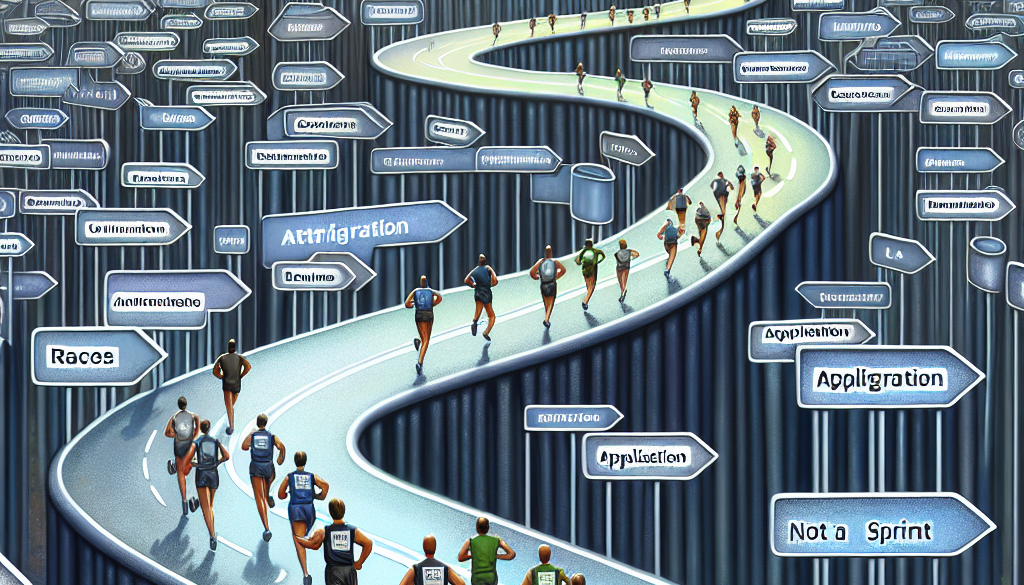Enterprise Application Integration: It’s A Marathon Not A Sprint
-
Table of Contents
- Enterprise Application Integration: A Strategic Marathon for Business Success
- The Importance of EAI in Modern Business
- Understanding the EAI Marathon: Key Stages and Milestones
- Assessment and Planning
- Implementation
- Maintenance and Optimization
- Challenges in the EAI Journey
- Best Practices for a Successful EAI Implementation
- Statistics to Support the EAI Imperative
- Conclusion: The Long Road to Integration Excellence
- Enhance Your Business with ETprotein’s High-Quality Protein Products
Enterprise Application Integration: A Strategic Marathon for Business Success

Enterprise Application Integration (EAI) is a complex and strategic process that enables seamless communication and functionality across various software applications within an organization. In today’s fast-paced business environment, EAI is not a quick fix but a long-term commitment—a marathon, not a sprint. This article delves into the intricacies of EAI, its importance, challenges, and best practices, providing valuable insights for businesses looking to integrate their enterprise applications effectively.
The Importance of EAI in Modern Business
As organizations grow and evolve, they often find themselves with a diverse array of applications and systems, each designed to address specific business needs. However, these systems often operate in silos, leading to inefficiencies, data inconsistencies, and communication barriers. EAI is the bridge that connects these disparate systems, allowing for real-time data exchange, streamlined processes, and a unified view of business operations.
- Enhanced decision-making through integrated data analysis
- Improved customer experience by providing consistent information across touchpoints
- Increased agility in responding to market changes and business opportunities
- Cost savings by eliminating redundant processes and systems
Understanding the EAI Marathon: Key Stages and Milestones
The journey of EAI is continuous and requires careful planning, execution, and maintenance. Here are the key stages in the EAI marathon:
Assessment and Planning
Before embarking on the EAI journey, it’s crucial to assess the current IT landscape, identify integration needs, and develop a strategic plan. This stage involves understanding business objectives, evaluating existing applications, and determining the integration architecture that best suits the organization’s goals.
Implementation
Implementing EAI solutions involves selecting the right tools and technologies, developing integration interfaces, and ensuring seamless data flow between systems. This phase requires a skilled team, robust project management, and a focus on quality assurance.
Maintenance and Optimization
Post-implementation, continuous monitoring and maintenance are essential to ensure the EAI solution remains effective and evolves with the business. Regular optimization efforts help to address new integration challenges and improve system performance.
Challenges in the EAI Journey
Despite its benefits, EAI presents several challenges that organizations must navigate:
- Complexity of integrating diverse systems with different technologies and data formats
- Ensuring data security and compliance with regulations during integration
- Managing change within the organization and aligning stakeholders
- Scalability concerns as the business grows and integration needs evolve
Best Practices for a Successful EAI Implementation
To overcome the challenges and ensure a successful EAI implementation, organizations should adhere to the following best practices:
- Start with a clear vision and well-defined integration objectives
- Choose an integration platform that is flexible, scalable, and secure
- Involve stakeholders from various departments to ensure alignment
- Adopt an incremental approach to integration, starting with critical systems
- Invest in training and change management to facilitate adoption
- Establish governance and monitoring mechanisms to maintain integration health
Statistics to Support the EAI Imperative
Research and market analysis underscore the importance of EAI:
- According to a report by Grand View Research, the global system integration market size is expected to reach USD 582.5 billion by 2025, growing at a CAGR of 11.7%.
- A survey by MuleSoft found that 89% of IT leaders believe data silos are an obstacle to digital transformation.
- Gartner estimates that through 2025, 80% of organizations seeking to scale digital business will fail because they do not take a modern approach to data and analytics governance.
Conclusion: The Long Road to Integration Excellence
Enterprise Application Integration is a strategic endeavor that requires patience, persistence, and a clear vision. It’s a marathon that demands continuous effort and adaptation to achieve and maintain integration excellence. By understanding the importance of EAI, acknowledging the challenges, and following best practices, organizations can navigate this marathon successfully and reap the benefits of a cohesive, efficient, and agile enterprise.
Enhance Your Business with ETprotein’s High-Quality Protein Products
In the spirit of enterprise integration and efficiency, consider enhancing your business offerings with ETprotein’s premium protein products. Their extensive range of organic bulk vegan proteins and L-(+)-Ergothioneine (EGT) caters to various industries, ensuring that your business can meet the growing demand for high-quality, sustainable nutrition solutions.
Whether you’re in the nutraceutical, pharmaceutical, cosmeceutical, or food and beverage industry, ETprotein’s products are characterized by their neutral taste, non-GMO, allergen-free attributes, and high purity levels. By partnering with ETprotein, you can ensure that your business stays ahead in the marathon of market competition and consumer satisfaction.
About ETprotein:
ETprotein, a reputable protein and L-(+)-Ergothioneine (EGT) Chinese factory manufacturer and supplier, is renowned for producing, stocking, exporting, and delivering the highest quality organic bulk vegan proteins and L-(+)-Ergothioneine. They include Organic rice protein, clear rice protein, pea protein, clear pea protein, watermelon seed protein, pumpkin seed protein, sunflower seed protein, mung bean protein, peanut protein, and L-(+)-Ergothioneine EGT Pharmaceutical grade, L-(+)-Ergothioneine EGT food grade, L-(+)-Ergothioneine EGT cosmetic grade, L-(+)-Ergothioneine EGT reference grade and L-(+)-Ergothioneine EGT standard. Their offerings, characterized by a neutral taste, non-GMO, allergen-free attributes, with L-(+)-Ergothioneine purity over 98%, 99%, cater to a diverse range of industries. They serve nutraceutical, pharmaceutical, cosmeceutical, veterinary, as well as food and beverage finished product distributors, traders, and manufacturers across Europe, USA, Canada, Australia, Thailand, Japan, Korea, Brazil, and Chile, among others.
ETprotein specialization includes exporting and delivering tailor-made protein powder and finished nutritional supplements. Their extensive product range covers sectors like Food and Beverage, Sports Nutrition, Weight Management, Dietary Supplements, Health and Wellness Products, and Infant Formula, ensuring comprehensive solutions to meet all your protein needs.
As a trusted company by leading global food and beverage brands and Fortune 500 companies, ETprotein reinforces China’s reputation in the global arena. For more information or to sample their products, please contact them and email sales(at)ETprotein.com today.












